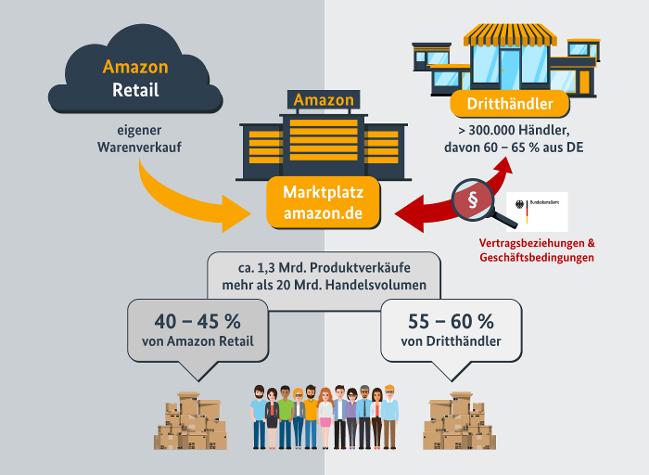Proceedings against Amazon

2013: Eliminating price parity clauses
In 2013 the Bundeskartellamt initiated a proceeding to put an end to so-called price parity clauses on Amazon Marketplace (see press release of 26 November 2013 and case summary). Under the price parity clause retailers were required to offer on Amazon the lowest price at which their products were sold through other sales channels. The price parity clause essentially prohibited retailers from selling the products offered on Amazon Marketplace at a lower price elsewhere on the internet. The prohibition applied both to other internet marketplaces and to the retailers’ own online shops. The proceeding was discontinued after Amazon had agreed to drop the price parity clause once and for all.
2019: Improved terms of business for sellers
Following a large number of complaints from retailers about Amazon’s business practices, the Bundeskartellamt initiated an abuse proceeding against Amazon in 2018 to examine its terms of business and practices in relation to sellers. The 2019 proceeding resulted in far-reaching changes, which Amazon implemented not only in Germany, but in some cases even worldwide. These include, for example, restricting the wide exclusion of Amazon’s liability, restricting the wide rights of use retailers must grant Amazon with regard to their product materials, and introducing the possibility of contesting Amazon’s refund decisions in the event of returns. Most notably, the clause on the place of jurisdiction, which previously established Luxembourg as the exclusive place of jurisdiction for EU marketplaces, was also changed. In certain circumstances, that is when special jurisdiction applies, national courts may now also have jurisdiction (see press release of 17 July 2019).

*The figures in the chart refer to the proceeding conducted in 2019.
2022: Amazon’s paramount significance for competition across markets
In July 2022 the Bundeskartellamt established in its decision under the newly introduced Section 19a GWB that Amazon is a company of paramount significance for competition across markets and is therefore subject to extended abuse control (see press release of 6 July 2022). In April 2024 the Federal Court of Justice upheld the Bundeskartellamt’s decision following an appeal by Amazon. In November 2022 the Bundeskartellamt extended two ongoing abuse control proceedings against Amazon to also include Section 19a GWB.
Price control
The Bundeskartellamt is examining the extent to which Amazon is decisively – and impermissibly – influencing the pricing of retailers on Amazon Marketplace by means of price control mechanisms and algorithms. In its examination the authority is primarily focusing on the fact that Amazon may block products of third-party sellers or prevent sellers from offering their products on Amazon Marketplace by arguing that their prices are too high (see press release of 14 November 2022).
Brand gating
In another proceeding the Bundeskartellamt is examining possible disadvantages for marketplace sellers caused by various instruments applied by Amazon, such as agreements with (brand) manufacturers which allow or exclude individual retailers from selling (brand) products on Amazon Marketplace (referred to as brand gating) (see press release of 14 November 2022).



